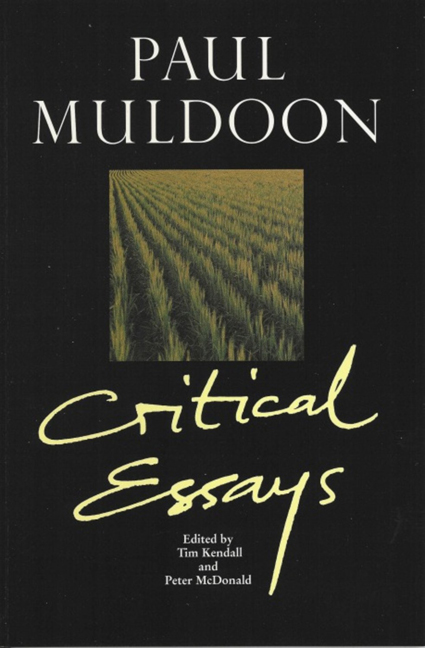Book contents
- Frontmatter
- Contents
- Acknowledgements
- Notes on Contributors
- Introduction
- ‘Thirteen or Fourteen’: Paul Muldoon's Poetics of Adolescence
- Never Quite Showing his Hand: Robert Frost and Paul Muldoon
- For Father Read Mother: Muldoon's Antecedents
- Pax Hibernica/Pax Americana: Rhyme and Reconciliation in Muldoon
- Muldoon and Pragmatism
- ‘All That’: Muldoon and the Vanity of Interpretation
- Paul Muldoon's Transits: Muddling Through after Madoc
- ‘All Art is a Collaboration’: Paul Muldoon as Librettist
- Muldoon's Remains
- Index
‘Thirteen or Fourteen’: Paul Muldoon's Poetics of Adolescence
- Frontmatter
- Contents
- Acknowledgements
- Notes on Contributors
- Introduction
- ‘Thirteen or Fourteen’: Paul Muldoon's Poetics of Adolescence
- Never Quite Showing his Hand: Robert Frost and Paul Muldoon
- For Father Read Mother: Muldoon's Antecedents
- Pax Hibernica/Pax Americana: Rhyme and Reconciliation in Muldoon
- Muldoon and Pragmatism
- ‘All That’: Muldoon and the Vanity of Interpretation
- Paul Muldoon's Transits: Muddling Through after Madoc
- ‘All Art is a Collaboration’: Paul Muldoon as Librettist
- Muldoon's Remains
- Index
Summary
Why do Paul Muldoon's poems regularly include phrases such as these: ‘Mercy was thirteen, maybe fourteen’ (‘Boon’); ‘Internal exiles at thirteen or fourteen’ (‘The Geography Lesson’); ‘I was thirteen or fourteen’ (‘Making the Move’); ‘she was twenty / or twenty-one’ (‘Big Foot’)? The same mannerism appears in his prose: Muldoon writes that he ‘first read Donne […] at the age of fifteen or sixteen’. The youngest age such phrases mention is ‘ten’; the oldest is ‘twenty-one’. These paired ages (I have not listed them all) are only one of the many ways in which Muldoon's work has used his, and our, notions of adolescence. From the adventure-tales and drug-lore of ‘Yarrow’ to the schooltime pranks of ‘Twice’, from the embarrassed chastity of ‘Cuba’ to the lubriciousness of ‘De Secretis Mulierum’, from recurring phrases to recurring characters (such as the schoolmate Will Hunter), many of Muldoon's poems include adolescent protagonists, or feelings and situations we associate with adolescence. These adolescent figures and situations can help us interpret Muldoon's styles, and his concerns.
No critic has looked at Muldoon's use of youth as such. Yet his poetry has long struck readers (both hostile and friendly) as somehow immature. Mark Ford described Meeting the British (admiringly) as ‘outlandish’ and ‘emotionally discontinuous’, comparing Muldoon's provocative personae to Seamus Heaney's ‘absolutely solid poetic personality’. For the American critic Calvin Bedient, Muldoon exhibits a ‘brilliant callowness’; he thus ‘fit[s] […] Ortega y Gasset's characterization of [modernism] as masculine and youthful’. Other critics have described Muldoon's ‘elusiveness’ (Peter McDonald), his ‘deconstructive impulse’ (Edna Longley), his ‘chimerical […] first-person voice’ (William Wilson), and his attraction to the ‘contingent and provisional’ (Steven Matthews). Muldoon's versions of youth and young people explain, and act out, the elusive, provocative stances so often remarked in his work. In her study of novels about adolescence, Patricia Meyer Spacks suggests that to recall youth is to imagine the self as provisional, unfixed: ‘As during those adolescent years,’ she writes, ‘one endlessly re-created oneself, trying out […] different possible roles, so now one re-invents those past selves, converting the shifting shapes of adolescence into images that make retrospective sense.’
- Type
- Chapter
- Information
- Paul MuldoonCritical Essays, pp. 6 - 25Publisher: Liverpool University PressPrint publication year: 2004



